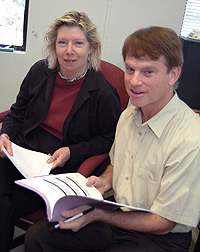Air Pollution Costs
San Joaquin Valley $3 Billion a Year
Economists' research, which
delves into school and work absences, chronic illness, hospitalization
and premature deaths, estimates that pollution costs
the region about $3 billion a year.
March 29, 2006 :: No. 185
A new study released
today puts a $3 billion price tag on the impact of air
pollution on the health of San Joaquin Valley residents. Conducted by a
team of nationally recognized economists and a leading
air-quality expert, the study is the first such analysis
of the region's air quality.
"The
Health and Related Economic Benefits of Attaining Healthful Air in the San
Joaquin Valley" is based on the review and analysis of dozens of peer-reviewed
economic and scientific studies. The results include the costs of health problems,
premature deaths, missed school days and decreased worker productivity that
result from air pollution in the region.
"It's
sobering to see the costs exacted by the Valley's polluted air. But now
we know the price the region pays," said Jane V.
Hall, an internationally
recognized authority on environmental economics, professor of economics and
co-director of Cal State Fullerton's Institute
for Economic and Environmental Studies.
The research
team includes Victor Brajer, Cal State Fullerton professor of economics who
has partnered with Hall on a number of environmental economics studies, and Fred
Lurmann, who has 27 years of experience in air-quality and exposure analysis,
and advises several state air-pollution agencies.
According
to the study, the cost of air pollution averages $1,000 per person per year,
and represents the following:
- 460 premature deaths among those age 30 and older
- 23,300 asthma attacks
- 188,000 days of school absences
- 3,230 cases of acute bronchitis in children
- 3,000 lost work days
- 325 new cases of chronic bronchitis
- 188,400
days of reduced activity in adults
- 260 hospital admissions
- More than 17,000
days of respiratory symptoms in children
The
report indicates that some communities, including those with
high populations of Latinos/Hispanics and African-Americans,
are harder hit than others, due to the varying concentrations
of dirty air around the region.
The report
cautions that the problem will become much worse if left
unaddressed. The San Joaquin Valley's current population
of more than 3 million residents is expected to grow by a
third by 2020, with traffic and driving expected to increase
at an even greater rate during the same period.
"The
San Joaquin Valley can't afford to foot this bill. We're losing
lives, money and making the Central Valley an increasingly less attractive
place to live and work. It is far too expensive to do nothing. We need to make
an investment in the region's economic future," said
state Sen. Dean Florez (D-Shafter), chairman of the Senate
Select Committee on Air Quality in the Central Valley.
"We
have a choice to make — watching the burden of air
pollution health effects increase for the region's
sensitive populations, the children and elderly, or getting
serious about cleaning up the San Joaquin Valley's
air for the 21st century," said Fred Lurmann,
one of the authors of the study.
The full report is available on the web
at: http://business.fullerton.edu/centers/iees/reports.htm
Media Contact:
Pamela
McLaren, Public Affairs, 657-278-4852 or pmclaren@fullerton.edu
Funding for the study was provided by the William and Flora
Hewlett Foundation, with support for the dissemination of
the study findings provided by The California Endowment.
The
Institute for Economic and Environmental Studies at
California State University, Fullerton issues regular economic
forecasts, provides analysis-based policy advice on economic
and environmental
issues, and studies
regional economic impacts. The institute undertakes independent
studies, as well as contract research into the areas of
its focus with private and public entities.
The William and Flora
Hewlett Foundation, has been making
grants since 1966 to help solve social and environmental
problems at home and around the world. The Foundation concentrates
its resources on activities in education, environment, global
development, performing arts, philanthropy and population.
It also makes grants to support disadvantaged communities in the San Francisco
Bay Area.
The California Endowment,
a private, statewide health foundation, was established in 1996 to expand access
to affordable, quality health care for underserved individuals and communities,
and to promote fundamental improvements in the health status of all Californians.
The endowment makes grants to organizations and institutions that directly
benefit the health and well-being of the people of California.
«
back to News Front
|

Jane V. Hall and Victory
Brajer, both professors of economics, review data from
their recently released study on the cost of air pollution
in the San Joaquin Valley.
|
|